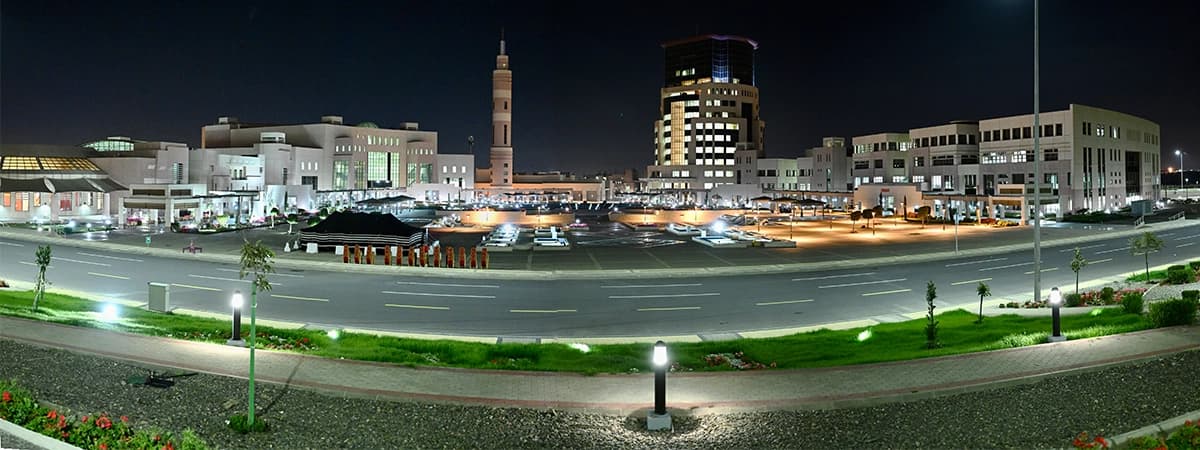King Khalid University
News & Events

Prince Sultan Bin Salman: The University Needs to Establish a College of Tourism and Archeology
King Khalid University-Media Center
His Royal Highness, Governor of the Asir Region, Prince Faisal bin Khalid, inaugurated this Tuesday the Urban Tourism Forum in the Mountainous Areas of Asir at the theater of the Asir Regional Municipality, in Abha. The event was held in the presence of the President of the Saudi Commission for Tourism and National Heritage, HRH Prince Sultan Bin Salman, and, Deputy Governor of the Asir Region, Chairman of the Tourism Development Council in the Asir Region, HRH Prince Mansour bin Muqrin.
The activities of forum started with National Anthem, followed by a recitation of the Holy Quran. The Chairman of the Organizing Committee of the Forum, Mr. Saleh bin Abdullah Al-Qadi, opened the forum with a speech, in which he emphatically stated,"The forum comes from the fact that the mountainous areas are aesthetic elements that need to be shown and taken care of from the tourism's industry point of view. This can be achieved through proper urban planning and design of buildings consistently with the natural surroundings. Asir has this advantage since this region is considered as the most awe-inspiring mountainous region in the Kingdom of Saudi Arabia."
As a part of his keynote speech, the President of the Saudi Commission for Tourism and National Heritage, HRH Prince Sultan bin Salman, stressed the need to establish a college of tourism and archeology at King Khalid University because of the tourist attractions and uniqueness that the Asir region has and is distinguished with.
HRH Prince Sultan bin Salman also pointed out that he is in contact with the Ministry of Education to approve the establishment of a college for tourism and archeology and another for architecture and planning, praising the roles provided by the university through its research centers to serve tourism in the region.
He also emphasized the importance of collaborative projects with citizens, government agencies, and developers to face the adverse effects of expansion that is happening in the mountainous areas. Such devastation will cause great loss to the citizens in their positions as well as an enormous economic loss to national tourism since it is regarded as being one of the most important financial components for the future of the economy and helping in creating employment opportunities.
Moreover, HRH Prince Sultan bin Salman elaborated on the close relationship between the development of locations, economy and sustainable ecotourism.
In more details, the frequent tourist is the most important element in the tourism economy. In order to ensure repeat tourists, we need to raise the level of eco-quality for visitors and ensure their first experiences are successful and enjoyable resulting in a connection to the place, people, heritage and relatively undisturbed natural areas.
"Every time I travel through the mountainous areas in our country, the faster the natural environment is decreasing and the greater the visual distortion is increasing," he added.
He continued to say, "We witnessed today a historic moment as we see the outstanding leadership of HRH Prince Faisal bin Khalid and before him HRH Prince Khalid Al Faisal. The Secretariat and the municipalities must cooperate and work to make the hoped-for shift in preserving our mountainous areas; otherwise, it will continue to deteriorate for the advantage of urban expansion and visual distortion."
It is worth mentioning that King Khalid University has recently signed a memorandum of cooperation with the Saudi Commission for Tourism and National Heritage. It includes exchanging information and experiences between the university, and the tourism information and research center (MAS). Organizing events and activities that have a positive impact on the tourist attractions of the Asir region are the main component of that relationship. In addition to that, the memorandum calls for the implementation of studies and statistical analysis on the economic, social and environmental impacts of the tourism activities and programs. Furthermore, it also covers the organization of courses and training programs for specialists in tourism activities, the restoration, and rehabilitation of historical and archaeological sites, and cooperation in the preparation of integrated studies and plans on the employment of urban heritage sites and buildings suitably with their urban composition while maintaining their originality and identity. Lastly, it includes the development and preservation of cultural heritage, in accordance with the university's scientific and human potential.
